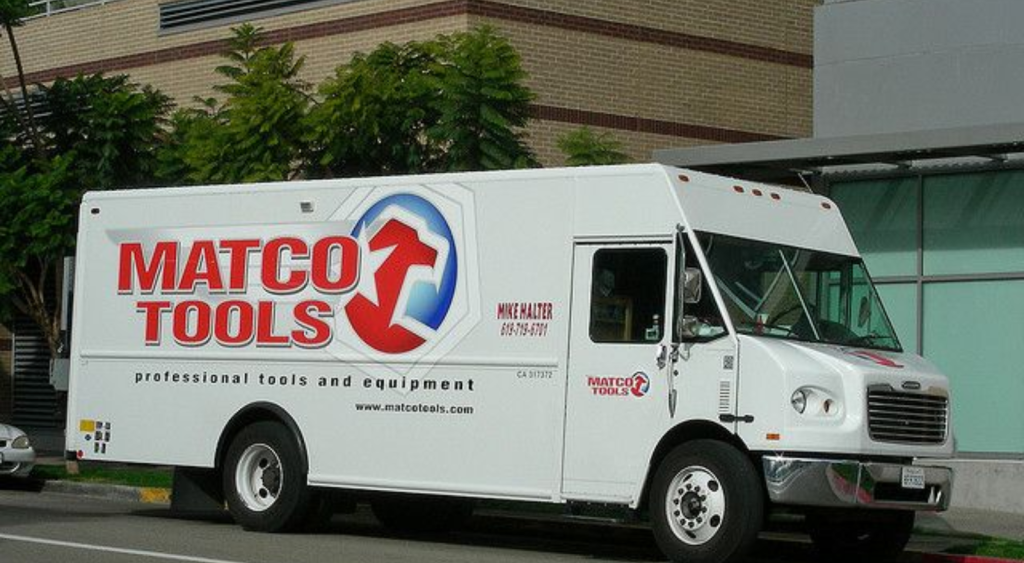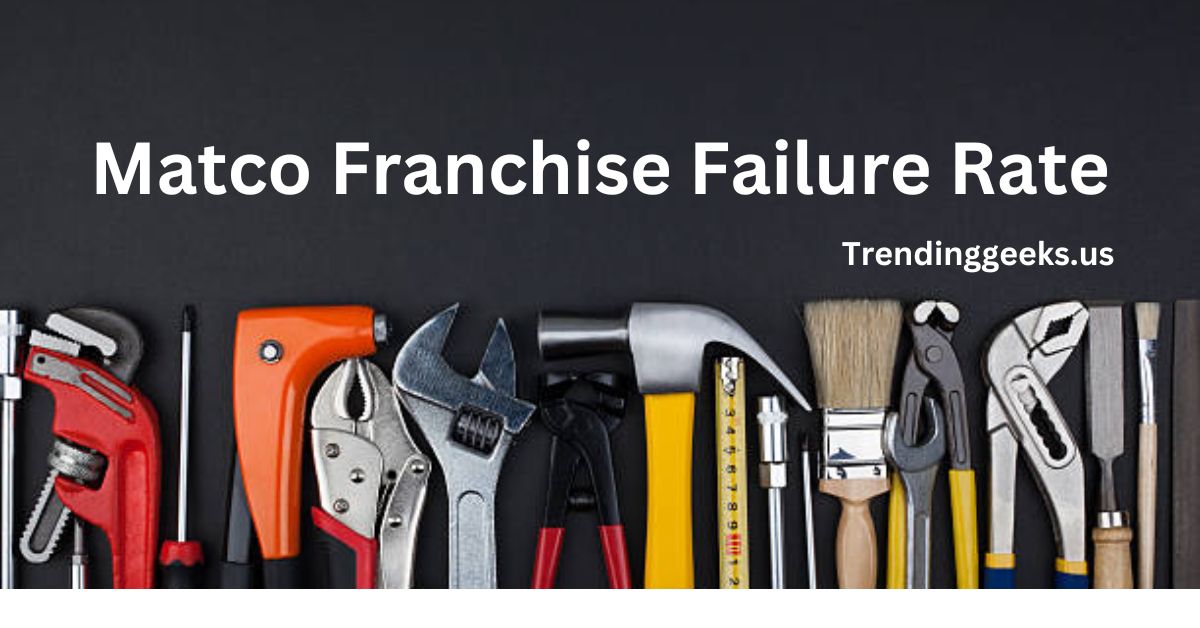When considering an investment in a franchise, understanding the potential risks is as crucial as knowing the rewards. The Matco franchise failure rate is an important factor that prospective franchisees must consider. This article provides an in-depth analysis of Matco’s franchise model, the factors influencing its failure rate, and practical steps to enhance the chances of success.

Introduction to Matco Tools and Its Franchise Model
Matco Tools is a prominent player in the automotive tools and equipment industry, offering a well-established franchise model. Founded in 1946, Matco has grown into a brand recognized for its high-quality tools and robust support system for franchisees. The franchise model allows individuals to operate independently under the Matco brand, distributing tools within a designated territory. Understanding how this franchise model operates is key to evaluating the risks and rewards, including the Matco franchise failure rate.
Everything You Need To Know About: Sharda iCloud
Understanding the Matco Franchise Failure Rate
Industry Benchmarks for Franchise Failure Rates
Franchise failure rates vary across industries, with a failure rate below 10% often considered favorable. Industry benchmarks provide a context for understanding how Matco franchises perform relative to other franchises. According to data, the general franchise failure rate ranges from 5% to 10% over a decade, but understanding where Matco stands within this range is crucial.
Specific Failure Rates for Matco Franchises
The Matco franchise failure rate is reportedly lower than many other franchises in the automotive sector. Factors such as comprehensive training, ongoing support, and exclusive territories contribute to this lower failure rate. However, it’s essential to recognize that success still depends heavily on individual circumstances, including market conditions and the franchisee’s management skills.
Factors Influencing Failure Rates in Matco Franchises
Several factors can influence the failure rate of a Matco franchise, including:
- Location: The demand for automotive tools varies by region, affecting franchise performance.
- Business Acumen: Franchisees with strong management skills and business experience tend to have better outcomes.
- Market Conditions: Economic downturns and market saturation can negatively impact sales, contributing to higher failure rates.
Key Factors Contributing to Matco Franchise Success
Importance of Location and Market Conditions
Location plays a pivotal role in the success of a Matco franchise. Operating in an area with a high concentration of auto repair shops or industrial businesses can lead to greater demand for tools, enhancing profitability. Conversely, areas with fewer potential customers may struggle, contributing to a higher Matco franchise failure rate.
Role of Business Management Skills
Successful Matco franchisees often have strong business management skills. Effective inventory management, customer service, and financial planning are essential for sustaining profitability. Franchisees lacking these skills or failing to adapt quickly may face significant challenges.
Impact of Marketing and Customer Relationship Management
Marketing is critical in differentiating a Matco franchise from its competitors. Franchisees who actively engage in marketing efforts and build strong customer relationships tend to perform better. Providing personalized recommendations, maintaining regular communication, and delivering exceptional customer service are key strategies for success.

Challenges Faced by Matco Franchise Owners
Common Operational Challenges
Running a Matco franchise comes with various operational challenges. These include managing inventory effectively, maintaining the tool truck, and ensuring customer satisfaction. Overcoming these challenges requires meticulous planning and execution.
Financial Management and Profit Margin Considerations
Profit margins for Matco franchises typically range between 20% and 30%. However, maintaining healthy margins requires careful cost management and pricing strategies. Franchisees must regularly monitor financial performance to avoid pitfalls that could lead to failure.
Dealing with Market Saturation and Competition
Market saturation is a significant challenge, especially in regions with multiple tool suppliers. Franchisees must find innovative ways to stand out, such as offering unique products or leveraging digital marketing channels to reach new customers.
Case Studies: Success and Failure Stories
Examples of Successful Matco Franchisees
Some Matco franchisees have achieved notable success by focusing on strong customer relationships and effective sales strategies. For instance, a franchisee in Texas grew their business to generate over $1 million in annual revenue within just a few years. Success stories like this highlight the potential of a Matco franchise when managed effectively.
Lessons Learned from Failed Matco Franchises
On the flip side, some Matco franchises have failed due to poor financial management, inadequate marketing, or failure to adapt to market changes. Analyzing these failures provides valuable insights into the risks and underscores the importance of proactive management.
Steps to Mitigate Risks and Improve Success Rates
Thorough Market Research and Due Diligence
Conducting thorough market research before investing in a Matco franchise is crucial. Understanding the local demand for tools and assessing the competitive landscape can provide a clearer picture of the potential risks and opportunities.
Leveraging Matco’s Training and Support Resources
Matco offers extensive training and ongoing support to franchisees. Taking full advantage of these resources can significantly reduce the risk of failure. Continuous learning and adapting to market trends are essential for long-term success.
Effective Inventory and Financial Management Strategies
Implementing effective inventory management and financial planning strategies can help franchisees maintain profitability. Regularly assessing inventory levels, monitoring cash flow, and adjusting pricing strategies are critical steps to mitigate financial risks.
Comparing Matco with Other Tool Franchises
Pros and Cons of Matco vs. Competitors
When compared to competitors like “Snap-on” and Mac Tools, Matco offers competitive advantages such as lower initial investment costs and strong support systems. However, the Matco franchise failure rate and other challenges must be weighed carefully against these benefits.
Profitability and Return on Investment Analysis
Matco franchises typically achieve profitability within the first two years, depending on market conditions and sales performance. Comparing the return on investment (ROI) with other tool franchises can help prospective franchisees make informed decisions.

Conclusion: Is a Matco Franchise Right for You?
Investing in a Matco franchise can be a rewarding venture, but it’s not without risks. The Matco franchise failure rate, while relatively low, highlights the importance of thorough research, effective management, and strategic planning. Prospective franchisees should carefully weigh the pros and cons, considering their financial resources, business skills, and market conditions before making a decision.
In conclusion, while the Matco franchise model offers potential for success, achieving that success requires dedication, competence, and a proactive approach to managing the various challenges that come with owning a franchise. By being well-prepared and leveraging the support and resources provided by Matco, franchisees can increase their chances of building a profitable and sustainable business.
Frequently Asked Questions (FAQs)
What is the Matco franchise failure rate?
- The Matco franchise failure rate is relatively low compared to other franchises in the automotive tools industry, typically ranging between 5% and 10%, depending on market conditions and management effectiveness.
What factors contribute to the failure of Matco franchises?
- Factors include poor location, inadequate business management skills, market saturation, and failure to adapt to changing market conditions.
How important is location in the success of a Matco franchise?
- Location is crucial, as franchises in areas with a high concentration of automotive businesses tend to perform better, while those in less ideal locations may struggle.
Can poor financial management lead to a higher failure rate for Matco franchises?
- Yes, poor financial management, including ineffective cost control and inventory management, can significantly increase the risk of failure.
How does Matco support its franchisees to prevent failure?
- Matco provides comprehensive training, ongoing support, and exclusive territories to help franchisees succeed, but success ultimately depends on individual efforts.
Is market saturation a significant risk for Matco franchises?
- Yes, market saturation can be a major risk, especially in regions with multiple competing tool suppliers, making it harder to establish a loyal customer base.
What are the most common operational challenges faced by Matco franchisees?
- Common challenges include managing inventory effectively, maintaining the tool truck, and ensuring consistent customer satisfaction.
How can Matco franchisees mitigate the risk of failure?
- Franchisees can mitigate risks by conducting thorough market research, leveraging Matco’s training resources, and implementing effective business strategies.
How does the Matco franchise failure rate compare to other tool franchises?
- Matco’s failure rate is generally lower than many other tool franchises, thanks to its strong support system and effective franchise model.
What role does customer relationship management play in preventing franchise failure?
- Building strong customer relationships through excellent service and regular communication is key to retaining customers and ensuring long-term franchise success.



